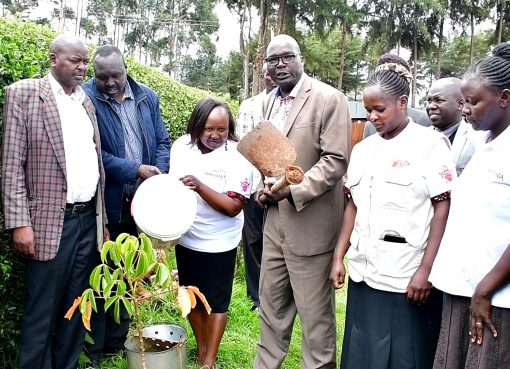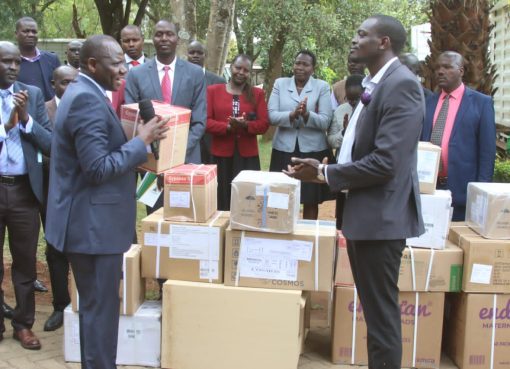Teachers and learners in Nandi County are a happy lot with the use of digital devices in their learning processes.
Currently, a total of 709 public primary schools out of 706 in Nandi County have received digital learning devices under the digital literacy programme.
In a brief to the ICT authority officials who toured the County to ascertain the status and usage of the devices in
schools, the County Commissioner (CC), Samuel Kimiti said the program has been a success with 99.5 per cent distribution.
Only three schools have not received the devices.
“Chesirgan, Kamagap and ADC Tolile t in Nandi East, South and North Sub counties respectively are the only schools not yet supplied with devices, “clarifiedKimiti.
At the moment 706 schools have already received upto 28,625 Learner Digital Devices, 1,412 Teacher Digital Devices and 706 projectors.
In addition a total of 6, 179 teachers have been trained on ICT skills so that they can be able to impart the same to learners.
“Technological empowerment of our children is key and we cannot run away from it but rather embrace it,” stressed the CC.
He pointed out that a multisector approach is needed to be able to roll out the programme fully.
“Parents, leaders, private sector, teachers and learners should be fully sensitized on the importance of the programme for it to be a success. “I will continue to use barazas to get all stakeholders embrace the program so that our children are not denied an opportunity from the negative publicity on matters DLP,” he promised.
The County Director of Education, Willie Machocho said with the programme in place, learning has become fan and enrollment in schools has also gone up.
“The programme has brought about a multiply effect whereby schools and homesteads are now connected to electricity and businesses have also thrived due to power availability, “explained Machocho.
The CDE explained that the first phase was meant to make the children learn to use technology but going forward they will be using technology to learn.
Machocho said the program is geared towards the second phase where each school shall have an ICT lab to serve the entire student population comfortably.
He urged the school administration to expose the devices to learners and not store them as it had been witnessed before.
The CDE however, pointed various challenges facing the programme in the county for instance, lack of power connectivity.
The other challenge is insecurity concerns whereby nine schools have been broken into and91 digital learning devices stolen.
Despite the challenges, the programme has realized several benefits to the learners, teachers and the community at large.
One of the benefits is the reduction in absenteeism and increased admission in schools.
According to Lilian Kosgei an ICT teacher at Nandi primary, cases of absenteeism are minimal since the learners are eager to use the devices.
“The learners are more attentive and elated when using the devices, and using the projector has made my work easier since every learner is abreast with every step on a particular lesson,” explained Mrs. Kosgei.
She however urged the Ministry of education to organize regular trainings on the use of ICT for the teachers and add more content to serve all grades.
Simon Katam Head teacher, Ndonyongaria primary school said teachers are happy with the programme and requested the government to consider channeling funds to construct a special room to house the gadgets.
DLP was started by the government in 2013 with an aim of ensuring pupils in grade one to three are able to use digital technology in learning with an objective of transforming the education system in Kenya.
Besides schools, the programme has provided a range of jobs, including ICT support centres, business opportunities in digital education, content development and e-waste management and disposal.
The programme has also enhanced learning in most public and private schools through the use of digital technologies thus growing Kenya’s global profile as a leader and hub in ICT.
Going forward in the second phase of the programme, computer laboratories are going to be set up to enable learners in the upper grade access computers to ensure inclusivity for all.
By Bethsheba Abuya/ Steve Mugambi




